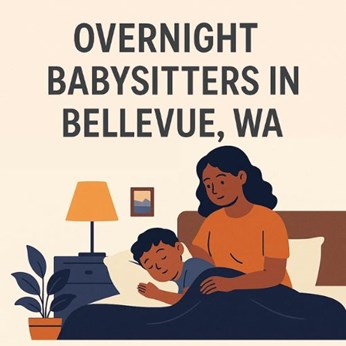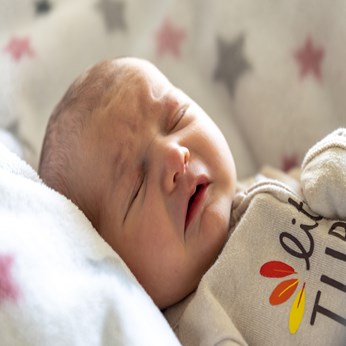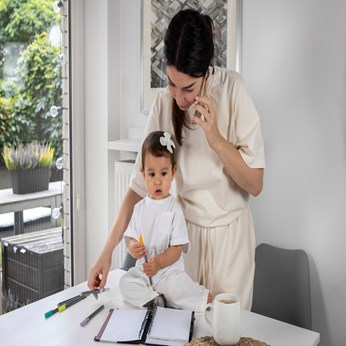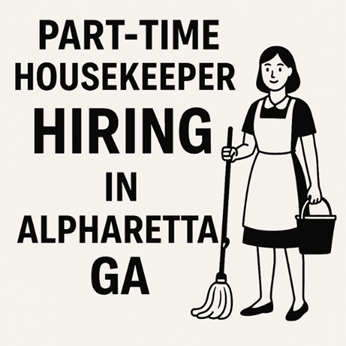5 Tips For Nannies To Ease Separation Anxiety In Young Children
Most children around the age of 8 to 9 months understand that their parents are permanent figures in their life and get upset when they can no longer see them; known as separation anxiety, they may begin to cry or cling to the parents when they fear they are leaving. Some children experience this anxiety more than the others, with the problem worsening when the parents admit guilt or remorse or change plans. Nannies can ease this anxiety by understanding it and making the child secure until the parent/parents return.
Each child is unique and a nanny may have to use a different method for easing separation anxiety in each child. However there are some general techniques that work for most children; learn what triggers the anxiety and think of different ways to first decrease and then eliminate separation anxiety.
5 tips a nanny can use to ease separation anxiety in children:
1) Most nannies get a chance to become familiar with the child/children; once hired most nannies get a chance to talk, play and get to know the child/children well before the first day of caring for them alone. These initial short meetings would make the child/children more comfortable with the nanny. There would be very little or no separation anxiety if the nanny is engaged when the child is an infant; they have always been with the nanny and would feel safe with them.
2) It would help a lot if the nanny learns about the child’s routine and tries to adhere as close as possible to their normal routine. A consistency of routine will make the child feel secure even when the parents are away; this will make the child/children feel that everything is the same minus the dad and mum.

3) It would greatly help ease separation anxiety when the nanny displays calmness and confidence; it would make the child/ children feel there is someone like their parents to protect and care for them.
4) Nannies could ease separation anxiety in children by being respectful to their feelings; she should listen and soothe the child/children patiently when he/she is upset. Nannies should never bring up the subject of parents, but at the same time should answer any questions about when their parents would return directly and honestly.
5) Nannies have to learn how to distract the child/children, but should not trick them. There should be some fun activity right after the parents leave. It is not a good idea to distract the child while a parent is leaving because firstly it just delays the inevitable once they realize the parent is gone. Secondly the child/children start feeling that the parent and the nanny tried to trick them giving rise to trust issues. Experienced nannies find ways to positively engage the child.
To conclude separation anxiety is a passing phase and most children get over it by the time they go to preschool when they start adjusting to new people and environments.
Image Courtesy: Google
Take the next step toward your goals
Share your requirement and find the best care providers in your area
-
Looking for a caretaker’s job? Build your profile and get in touch with families in your vicinity.
-
Discover nannies, babysitters, cooks, housekeepers, pet sitters, and elder care under one roof.
-
Get all the support you need to run a successful care center.
-
Search for appropriate centers near you depending on your needs.
Care Corner Insights: Blog Library

Overnight Babysitters in Bellevue, WA for Business-Travelling NRI Parents: Safety & Policies
For many NRI parents living in Bellevue, WA, frequent business trips are a reality. While traveling, one of the biggest concerns is ensuring your children are safe, cared for, and emotionally supported during overnight stays. Overnight babysitters ca

Indian Home-Style Cooks in Queens, NY: Tiffin-Style Weekly Meal Prep from Your Kitchen
Queens, NY, is home to one of the most diverse food cultures in the country, and Indian cuisine holds a special place among families looking for authentic, comforting meals. While restaurant takeout is convenient, nothing compares to the taste and nu

Baby Sleep Problems: What is Sleep Regression and How to Handle It
If you’re a parent, you know that baby sleep is one of the greatest mysteries of life. One day your little one is snoozing like an angel, and the next day they’re suddenly waking up every hour, fussing, or refusing to nap. Before you panic, there’s a

What is Validation Therapy? A New Approach to Dementia Care
Caring for loved ones with dementia is one of the most emotionally challenging journeys a family can face. Traditional methods often focus on correcting memory lapses or redirecting confused thoughts—but that can sometimes lead to frustration, stress

What is a Part-Time Nanny and Do You Need One
Parenting is a beautiful journey, but let’s be honest—it can also be exhausting! Between work deadlines, household chores, and family responsibilities, sometimes there just aren’t enough hours in a day. That’s where part-time nannies step in, offerin

Part-Time Housekeeper Hiring in Alpharetta, GA: Weekly Schedules, Pricing, and Must-Do Tasks
Keeping a home spotless while balancing work, family, and personal commitments can be overwhelming. For families and professionals in Alpharetta, GA, hiring a part-time housekeeper is one of the most practical solutions. Whether you need help once a

Affordable Daycares in Irving, TX with Indian Menu Options: Parent Reviews & Enrollment Tips
Finding the right daycare for your little one is never an easy decision—especially if you’re looking for one that fits your budget and offers familiar food options like an Indian-inspired menu. For parents in Irving, TX, the good news is that several

Can Babies Sleep on Their Side? Tips for Safe Baby Sleep
When it comes to newborns, every parent worries about the smallest details—how they sleep, what they wear, even which way they turn their tiny heads. One common question that pops up is: “Can babies sleep on their side?” The short answer? Not recom

8 Benefits of Hiring a House Cleaner for Your Home
Let’s be honest — keeping a home sparkling clean while juggling work, family, and daily life can feel like a full-time job in itself. That’s where professional house cleaners step in, turning the chaos into calm. If you’ve been debating whether to br

How to Care for a Gassy Baby? What’s Normal and what’s not – Expert Advice
If you’re a new parent navigating the world of burps, bubbles, and baby fussiness—welcome to the club! Gas in babies is incredibly common, especially in the first few months. But how do you know what’s normal and when it’s time to call in expert help